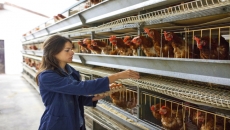The return of playful, popular sea otters to the Pacific shores of British Columbia is adding nearly $50 million a year to the province's economy despite its impact on valuable fisheries, says a study.
University of British Columbia researchers say their conclusions may apply anywhere top predators have been returned to ecosystems from which they had been eliminated.
But they warn the benefits must be evenly shared.
"When people invest in restoring ecosystems, including top predators, it can have large, positive benefits for people," said Russ Markel, one of the authors of the paper published Thursday in the journal Science.
"(But) First Nations and coastal communities were not consulted when sea otters were reintroduced 50 years ago and many of the benefits are not reaching or remaining in them."
Sea otters were nearly wiped out along the B.C. coast by 19th-century fur traders. In the otters' absence, prey species such as clams, sea urchins and crabs thrived.
Those booms gave rise to lucrative fisheries that sustained small towns and First Nations along the coast for decades.
Between 1972 and 1979, 89 sea otters were reintroduced to their former habitat and protected under the Species At Risk Act. There are now thousands of them.
The scientists attempted to measure the environmental, economic and social impacts of the population increase and weigh them against each other in dollars.
"This study takes this complex tangle of predator-induced interactions and it places them in a social and economic context," said co-author Jane Watson.
With fewer urchins grazing on them, underwater kelp forests have grown twentyfold, providing new habitat for a range of fish from rockfish to salmon. Stocks of ling cod have tripled and the overall amount of life in the water has increased by 37 per cent, which has created new fisheries worth nearly $10 million.
More carbon has been stored, worth about $2 million at current carbon prices. Tourists have spent a total of about $42 million for the privilege of seeing the otters cavort.
But otters eat up to a quarter of their body weight every day, so various clam fisheries have lost about one-quarter of their value. Fewer crabs and sea urchins have been landed.
The paper estimates the total loss at just over $7 million. That leaves a net benefit of about $46 million, although the scientists acknowledge a wide margin of error.
Much of that net benefit has escaped local people, the paper says.
"Sea otter recovery is unpopular in many coastal communities."
Some of those communities have a cultural preference for their old catches of clams and crabs and miss the delicacy of a fresh urchin. Some are simply shut out from the new ecosystem.
Commercial fishing licences are concentrating in fewer and fewer hands, said co-author Kai Chan.
"It's a lack of access and declining access to boats and fish and licences," he said. "They're surrounded by abundant shellfish and fish resources, but in many cases they don't have the licences, the boats and the fuel to get out and access them."
The authors urge reorienting fisheries policy toward local benefits and food security. They suggest returning to some traditional practices such as clam gardens, which use rock walls at low-tide lines to increase the amount of productive shellfish habitat on a beach.
"It's hard to adapt," Watson said. "It will take a great deal of clever interactions between traditional management and understanding the ecology."
The sea otter experience emphasizes the importance of ensuring benefits of reintroducing top predators — such as the return of wolves to United States rangelands — are shared, the scientists say.
"The structure of (our) model is eminently transferable to any system," said co-author Ed Gregr.
"With the wolves, some of the local communities have seen the benefits associated with toursim and recreation. Meanwhile, the ranchers benefit much less.
"One of the things that has been helpful are programs that allow ranchers to benefit from compensation so that the costs associated with this top predator that brings such important benefits to the region are not being experienced acutely by ranchers."






